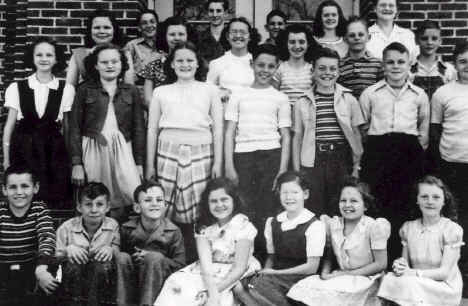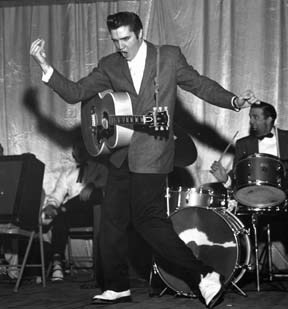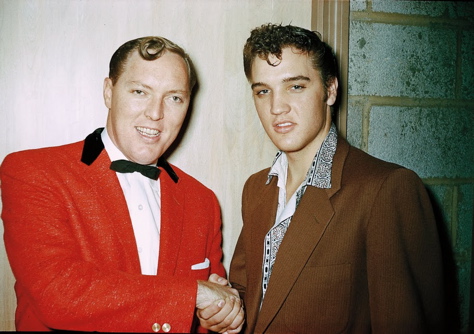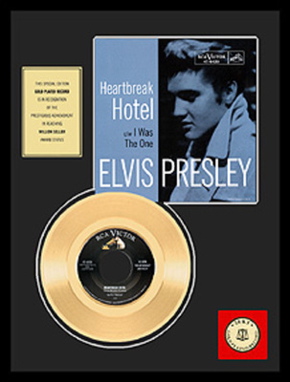
Elvis Aaron Presley was born to 18-year-old Vernon and 22-year-old Gladys Presley in a two-room house built by his father in Tupelo, Mississippi at 4:34 a.m. on January 8, 1935. His twin brother, Jessie Garon, was stillborn, leaving Elvis to grow up as an only child. Elvis thus became very close to his parents, especially his mother. From the beginning, gospel roots grew in Elvis. He would try to sing along with the choir at the Assembly of God Church in Tupelo.

In 1941, Presley began first grade at East Tupelo Consolidated. His teacher was impressed with Elvis' version of the Red Foley song "Old Shep" during morning prayers and encouraged him to enter a singing contest at the Mississippi-Alabama Fair and Dairy Show. On October 3, 1945, ten-year-old Elvis, dressed as a cowboy, gave his first public performance, standing on a chair to sing "Old Shep" into the microphone. His parents bought him his first guitar at Tupelo Hardware Store on January 8, 1946 for his 11th birthday. Two of Elvis' uncles and the new pastor at the family's church gave him basic guitar lessons, although Elvis said he would never sing in public, being "very shy about it".

Presley in 6th grade--third row, right
In sixth grade, Elvis was pretty much a loner, playing and singing his guitar during lunchtime. For this he was teased for being a "trashy" kid who played hillbilly music. Elvis became quite interested in the Mississippi Slim show on Tupelo radio station WELO. Slim's younger brother was a schoolmate of Elvis and took him to the station often. Slim reserved time for Elvis to give two on-air performances. He backed out because of stage fright the first time but did perform the next week.
Elvis and his parents moved to Memphis, Tennessee in November,1948 and were soon granted a two-bedroom apartment in a public housing complex known as the Courts (the family was quite poor). Elvis enrolled in Humes High School but only received a "C" in music in the eighth grade. His music teacher told him he had no aptitude for singing. In 1950, neighbor Jess Lee Denson and Elvis began practicing together. Soon, three other boys including brothers Dorsey and Johnny Burnette joined them to play around the neighborhood. In September, Elvis got his first job at Loew's State Theater. He also worked at Precision Tool and MARL Metal Products.

In his junior year, Elvis grew out his sideburns and began styling his hair with rose oil and Vaseline. Gospel music greatly influenced and inspired Elvis; he would hear it in church and at All-Night Singings at gospel songfests downtown at the Ellis Auditorium. Groups such as the Statesmen Quartet would influence Presley's future stage performance. :It is also important to note that American R&B was an important influence at well, as R&B was prevalent on Beale Street in Memphis. He would often go to Beale Street, where blues music blared out from nearly every building. He developed an interest in wild, flashy clothes. Elvis was beginning to feel more comfortable about performing and signed up for the annual "Minstrel" show in April of 1953. He sang "Till I Waltz Again with You", a hit for Teresa Brewer. After that appearance, Elvis became considerably more popular with his classmates.

Elvis never received formal music training of any kind and what he learned, he learned, studied and played by ear. He listened to songs from jukeboxes and particularly loved tunes by country artists. Southern gospel singer Jake Hess was a huge influence on Elvis' ballad-singing style. Presley listened to spirituals, blues and the backbeat sound of rhythm and blues on regional radio stations around Memphis.

Prior to his senior year, Elvis stopped by Memphis recording studio Sun Records to record "My Happiness" and "That's When Your Heartaches Begin". Sun boss Sam Phillips asked his receptionist to note the young man's name. Presley recorded a second record--"I'll Never Stand In Your Way"/"It Wouldn't Be the Same Without You" in January but nothing became of it. Presley auditioned for a local vocal group called the Songfellows but he was rejected because the group didn't feel he had an ear for harmony.

In April, Elvis took a job for Crown Electric as a truck driver. Friend Ronnie Smith suggested he contact Eddie Bond, who was the leader of Smith's band. The band needed a vocalist and Elvis indeed tried out. Bond rejected Elvis, telling him to "stick to truck driving for you'll never make it as a singer." Presley graduated from Humes High School in 1954.

Elvis, Bill Black, Scotty Moore and Sam Phillips
Phillips, meanwhile, loved the R&B sound and was on the lookout for someone that could take the sound to a broader audience. Sam would say to his secretary, "If I could find a white man who had the Negro sound and the Negro feel, I could make a billion dollars." Phillips remembered the young Memphis boy who had recorded a couple of songs in his studio and invited him to the studio. Phillips asked Elvis to perform as many songs as he knew, and was impressed enough to invite two local musicians, guitarist Scotty Moore and upright bass player Bill Black to work with Elvis.

Memphis DJ Dewey Phillips
A session was scheduled for July 5 and didn't seem like it was going anywhere. Just about when they were all ready to go home, Elvis picked up his guitar and began singing a 1946 blues song by Arthur Crudup called "That's All Right". Elvis started jumping around and then Black got excited and became animated. Phillips had the door to the control booth open and began taping the session. This was the sound he had been looking for. Three days later, Memphis D.J. Dewey Phillips played the song and by the end of the night, interest was so great that Phillips was playing the song repeatedly the last two hours.

The trio played publicly July 17 at the Bon Air club. Later that month, they performed at the Overton Park Shell. Partly because of nervousness and partly because of Elvis responding to the rhythm of the song, he began to shake his legs as he performed. His wide-cut pants emphasized his movements and young women in the audience started screaming. Elvis would back away from the mike while shaking his legs and the crowd went crazy.

Bob Neal became the trio's manager and from August through October, they would play at the Eagle's Nest club and record at Sun Studio. Elvis appeared on Nashville's Grand Ole Opry on October 2 but Opry manager Jim Denny told him he did not suit the program. Two weeks after that, Presley was scheduled on Louisiana Hayride, a show broadcast to 198 radio stations in 28 states. After a slow start, Presley caught fire and was signed to a year's contract. Elvis bought a new Martin guitar for $175 and the trio began playing in Houston, Texas and Texarkana, Arkansas.

By 1955, Elvis had become a pretty big star in the south and was brought to the attention of Colonel Tom Parker, who was considered the best promoter in the music business. Parker had managed Eddy Arnold and Hank Snow, and booked Elvis on Snow's February tour. On a stop in Odessa, Texas, 19-year-old Roy Orbison caught his show and was highly impressed. On March 3, Louisiana Hayride was broadcast on television on KSLA. But the trio's songs were a blend of country and R&B and had trouble getting airplay. Country radio stations would not play them because they sounded "black" and none of the R&B stations would play it because "he sounded like a hillbilly".

Bill Haley and Elvis meet backstage
The blend became known as rockabilly, and Elvis was billed with names such as "The King of Western Bop", "The Hillbilly Cat" and "The Memphis Flash". Hayride drummer D.J. Fontana joined the group to make it a quartet. In mid-October, they played a few gigs supporting Bill Haley, who had reached #1 with "Rock Around the Clock". Presley was voted the year's most promising male artist at the Country Disc Jockey Convention in early November. Parker arranged a deal with RCA Victor on November 21 to purchase Presley's Sun contract for $40,000. Right away, RCA began heavily promoting its new artist and reissued several of his Sun recordings.
.jpg)
On January 10, 1956, Elvis recorded his first songs for RCA in Nashville, Tennessee. RCA brought in pianist Floyd Cramer, guitarist Chet Atkins, and three vocalists to complete the sound that they wanted. That first session produced a song called "Heartbreak Hotel", which RCA released on January 27. Elvis appeared on the CBS-TV "Stage Show" six times over the next two months. After his first show, Presley stayed in town to record eight songs, including his version of Carl Perkins' hit "Blue Suede Shoes". In February, a song Elvis had recorded at Sun--"I Forgot to Remember to Forget", became #1 on the Billboard country chart. On March 2, Parker officially became Presley's new manager, replacing Neal.

Elvis now had enough songs to release an album and his self-titled LP was released March 23. Parker booked Elvis for two appearances on "The Milton Berle Show" on NBC-TV. Presley was a huge hit as he performed on the deck of the USS Hancock in San Diego before sailors and their dates. Then, 12 weeks after its release, "Heartbreak Hotel" hit #1 on the Billboard chart.
And Elvis was off and running.
(In tomorrow's segment of Elvis Week 2011 on Inside the Rock Era--"The Rise to Superstardom".)

No comments:
Post a Comment
Note: Only a member of this blog may post a comment.